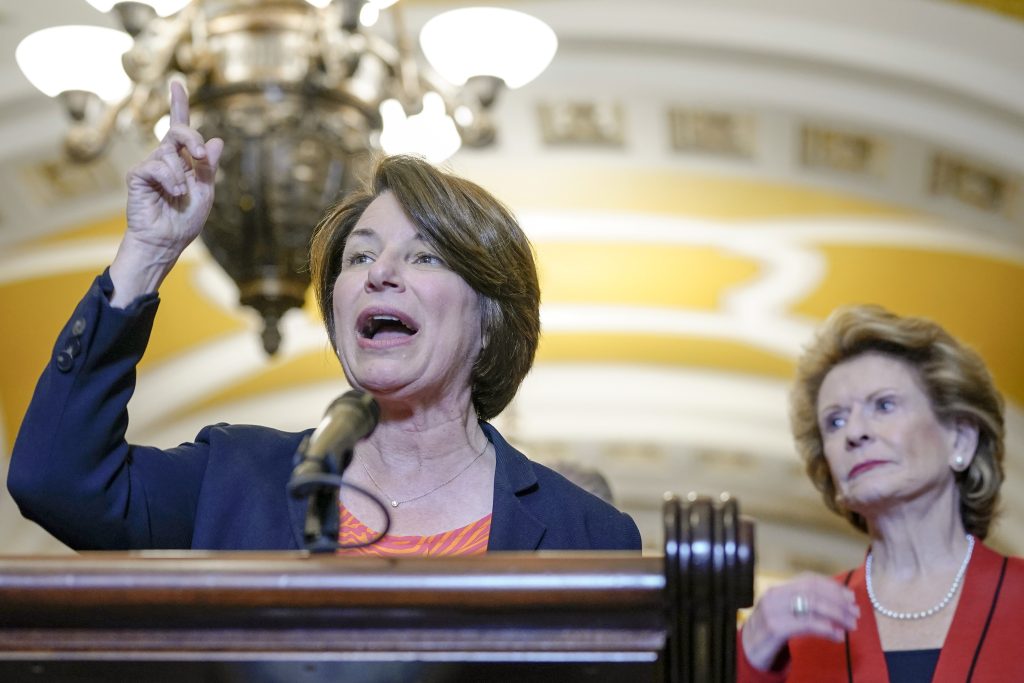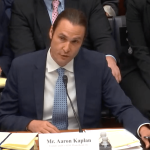The race for the White House is shaping up as a battle between senior citizens. But out of the spotlight, in the campaigns for the Senate’s No. 3 spots in both parties, a younger class of leaders is on the rise.
Two Gen X Republicans are already running for the third-ranked post: Sens. Joni Ernst of Iowa, 53, and Tom Cotton of Arkansas, 46. Similar intrigue is building on the Democratic side, where a retirement will open up the parallel leadership job next year: Sens. Amy Klobuchar of Minnesota, 63, and Cory Booker of New Jersey, 54, are being discussed as contenders while several others eye a move up, according to interviews with five Democrats familiar with internal dynamics.
Both parties see the coming rise of fresher faces as a welcome development for the stodgy Senate. While the No. 3 leader has less sway than the successor to Senate GOP leader Mitch McConnell when he steps down as leader at the end of the year — not to mention Senate Democratic leader Chuck Schumer, 73, who isn’t going anywhere — the chamber will feel the ramifications of the upcoming mid-range leadership elections for years to come.
“I’d like to see more young voices in Congress, in both chambers, in both parties, and in positions of leadership in both committees and the caucuses,” said Jon Ossoff (D-Ga.), who is the youngest sitting senator at 37. “It’s important to have a breadth of perspective and experiences represented in governing bodies.”
The Ernst-Cotton race and competition on the Democratic side are happening thanks to a rare shuffle in Senate leadership ranks often dominated by septuagenarians. And both carry outsize weight: The winners of each would have the inside track to be future party leaders. Proposals to term-limit the Senate GOP leader — be it John Cornyn (R-Texas), 72, John Thune (R-S.D.), 63, or somebody else — could speed up that timeline.
So while McConnell’s departure from leadership will already usher in a new generation, there’s a larger insurgency of youth afoot.
The concept of the “next generation” in the Senate is relative, given that the average age in the chamber is currently 64. Compared with Schumer and the 82-year-old McConnell, the hopefuls for the No. 3 spots are whippersnappers who would imbue the top ranks with fresh energy.
In addition to Klobuchar and Booker, both of whom unsuccessfully challenged Joe Biden for the party’s 2020 presidential nomination, another name is floating around in Democratic circles as a potential future leadership member: Sen. Chris Murphy of Connecticut. The 50-year-old is fresh off a border deal with the GOP that pushed his party’s comfort zone.
Not to mention that both parties will need new campaign chairs next year. There’s already plenty of buzz about a Democratic Senatorial Campaign Committee helmed by Sen. Alex Padilla (D-Calif.), 50, who didn’t deny interest in the job but said his focus is on the election at hand. Sen. Tina Smith (D-Minn.), 66, current vice chair of the DSCC, is also on Democrats’ radar for future leadership, either at the campaign arm or elsewhere.
On the GOP side of the aisle, Senate Republicans are expecting the conference chair race between two of their younger senators to be “super close,” as Sen. Thom Tillis (R-N.C.) put it.
Ernst, who’s currently No. 4 in Republican leadership, said age does matter in the contest: “There’s so many things that go on policy-wise that are relevant to a new generation.”
“I’m that bridge between the up-and-coming leadership era” and the newer class, she added, “as well as a tie to those who have leadership experience.”
Cotton is well-known in the party but making his first bid for leadership. While Ernst is a regular at McConnell’s weekly pressers, the Arkansan is not. He weighs into issues selectively, often in conservative media or committee hearings rather than spontaneous hallway interviews. That would make Cotton a stylistic break from the GOP’s current leadership.
Still, he’s not exactly embracing the idea of generational turnover, telling POLITICO in a statement: “I don’t accept your premise. Whether you’re a newer senator or an old bull, we’re all united in our conviction that Joe Biden and the Democratic Senate has been a disaster for America.”
In the top-billed GOP race, Thune is nearly 20 years younger than McConnell. Cornyn is pushing for term limits on the conference’s next No. 1, a move that would hasten turnover in the post-McConnell era and suggests he doesn’t plan to hold the job forever. Sen. John Barrasso (R-Wyo.), 71, took a pass on a leader run and will pursue the whip job, which he can hold for six years under party rules.
The future Democratic leadership opening is a result of the upcoming retirement of Sen. Debbie Stabenow (D-Mich.), who is currently the policy and communications committee chair. The jockeying for the No. 3 spot is still in its early stages, and Schumer may decide to reorganize his team rather than choose a one-to-one replacement for Stabenow.
Still, the opening is expected to spark competition within the caucus, including from people not currently in the top rungs of Senate Democratic leadership, said one party aide — who, like others interviewed, was granted anonymity to speak candidly.
Klobuchar is perhaps the most buzzed-about possibility, having moved up to nab the No. 4 spot in caucus leadership last year.
“Now is not the time to be talking about leadership elections,” Klobuchar spokesperson Jane Meyer said in a statement, saying the senator’s focus is on legislating and this fall’s Senate races.
Booker is vice chair of Stabenow’s messaging panel and could be a formidable contender for the No. 3 spot. Known for his amiable persona despite his more pugnacious mentality during the Trump years, Booker said he hasn’t “given much thought” as to whether he’d be interested in the job. If he decides to vie for it, he’d certainly have some support.
“I’d support Cory to do whatever he wanted to do and is open to doing,” said Sen. Ben Ray Luján (D-N.M.).
Lujan also mentioned Sen. Brian Schatz (D-Hawaii), the deputy whip and deputy conference secretary, as a younger senator who has already stepped up his game on the floor and in caucus. Senate Majority Whip Dick Durbin (D-Ill.), the longest-serving party whip ever, said he’d like to keep his job in the next Congress.
Then there’s Murphy. His border work fizzled, but it still won him currency among colleagues who lauded him for diving into the complex issue of immigration. Sen. Jon Tester (D-Mont.) said “Murphy helped himself” with his border work and guessed that a half-dozen younger Democrats could potentially fill leadership roles in the next Congress.
Murphy himself said he’s not made his mind up yet on whether he’ll run for a leadership role next term.
Senate Republicans will elect their leaders in secret-ballot votes in January. Winning will require only a simple majority within the conference. Democrats will undergo a similar process, but Schumer is deft at avoiding internal disarray and almost uniformly looks to minimize division in the caucus.
Still, some senators are excited to see genuine rank-and-file competition. In many cases, like committee chairs, seniority dictates the winners. But competitions for party leadership don’t come around that often.
As Tillis put it: “It provides an opportunity to go back and maybe create that healthy competition among friends.”






